Os melhores artigos de investigação do quadrimestre
Highlights
Autores: Rodolfo Bruniera Anchieta, Lucas Silveira Machado,
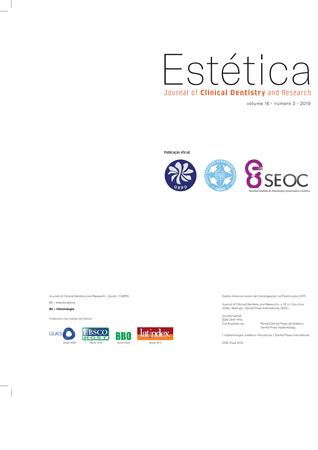
ULRICH LOHBAUER é supervisor do Laboratório de Pesquisa em Biomateriais Dentários da Clínica Odontológica 1 (Dentística Operatória e Periodontia) da Universidade de Erlangen-Nuremberg (Erlangen, Alemanha). Os interesses do Laboratório estão voltados para o desempenho mecânico dos materiais odontológicos, como as cerâmicas multicamada, polímeros nanoparticulados ou cimentos biocompatíveis e autoadesivos. O estudo, em nível nanométrico, da área de união adesivo-tecido dental...
Leia mais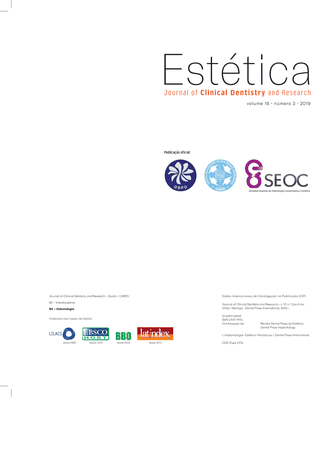
Introdução: fraturas em dentes anteriores são consideradas, frequentemente, como emergência na prática odontológica. A reabilitação estética e funcional é o principal objetivo do tratamento. Fraturas de coroa não consideradas complicadas envolvem esmalte e dentina e podem receber diferentes níveis de tratamento, tais como colagem do elemento dentário ou restauração com materiais compósitos. Objetivo: relatar uma abordagem terapêutica breve de três casos de pacientes que...
Leia mais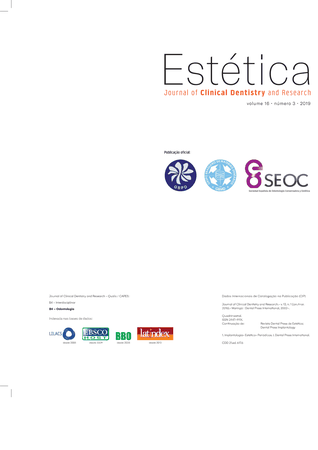
RESUMO: Introdução: esse é o quarto de seis artigos que abordam uma análise geral da literatura sobre resinas compostas nos últimos dez anos. A contração de polimerização faz parte do processo de fotopolimerização e pode gerar tensão de contração residual, que pode ser relacionada com microinfiltração, microtrincas, sensibilidade pós-operatória e cárie secundária. Assim, o objetivo da presente revisão de literatura foi reunir e sintetizar os dados de contração de...
Leia mais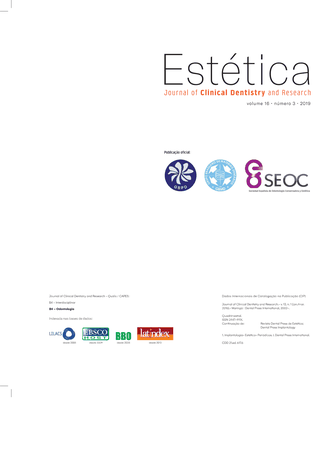
Objetivo: avaliar o efeito de diferentes trata- mentos de superfície e o processamento de uma cerâmica à base de dissilicato de lítio sobre a resistência de união e características interfaciais com um cimento resinoso fotoativado. Material e Métodos: foram confeccionados 20 blocos prensados (IPS e.max Press) e 20 na técnica CAD/CAM (IPS e.max CAD) (10 mm de diâmetro x 1 mm de espessura). Cada tipo de processamento foi dividido em quatro grupos (n = 5), de acordo com o tipo de...
Leia mais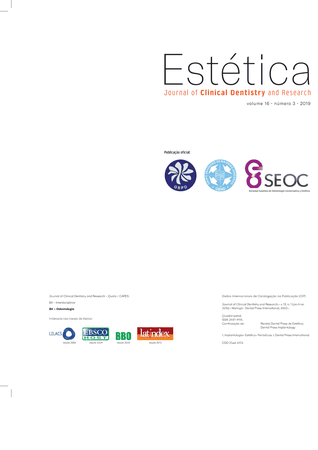
Introdução: o desempenho satisfatório de um material restaurador quando exposto a um desafio químico pode ser relevante para sua indicação clínica. Objetivos: esse estudo investigou, in vitro, os efeitos do desafio químico na resistência à compressão (RC), resistência à tração diametral (RTD), rugosidade superficial (R), dureza superficial (D), liberação de flúor (F) e características morfológicas (MEV) de cimentos de ionômero de vidro (CIVs) populares. Métodos: os CIVs...
Leia mais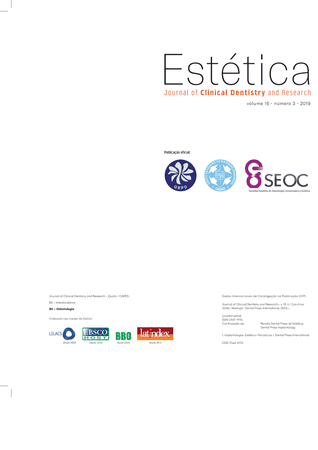
Não nasci dentista; tornei-me um. Odontologia não pode ser o norte para uma vida bem vivida. A não ser que você trabalhe com sorrisos, e não dentes. Vejo muita gente falando de laminados e protocolos cerâmicos, resinas x cerâmicas, Odontologia pura, mas o ato de sorrir ultrapassa e transcende a técnica. Para se fazer sorrir, não basta ser dentista, tem que ser uma boa pessoa. Despertar sorrisos não é pra qualquer um com diploma de graduação. É despertar, não fabricar. Lembro das...
Leia mais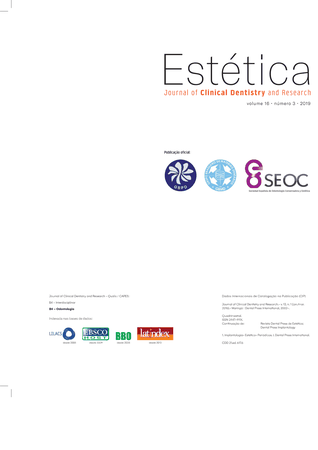
Objetivos: a) determinar a influência do aparelho fotoativador (“monowave” e “polywave”) sobre o grau de conversão (GC) em razão da profundidade, quando testadas diferentes formulações de resinas bulk-fill; b) determinar qual parâmetro de avaliação de luz é capaz de predizer a capacidade de fotoativação em razão da profundidade de compósitos bulk-fill e c) verificar se esses parâmetros estão relacionados ao custo da fonte de luz. Métodos: foram usadas quatro fontes do...
Leia mais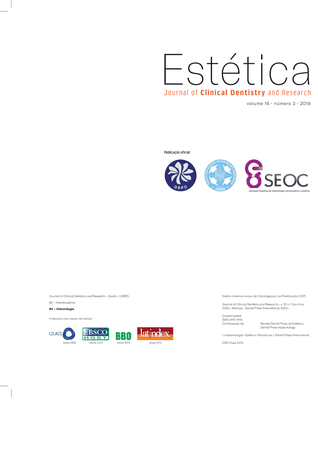
Localizada no Passeig de Gràcia, 86, em Barcelona, na Espanha. Autrán Dental é um espaço recém-criado, localizado no centro neurálgico da rotina das pessoas, na avenida com a maior identidade arquitetônica da cidade e em frente ao edifício Pedrera, objeto de culto de todos os amantes da arquitetura gaudiniana e, por extensão, de grande parte dos visitantes da cidade.
Leia mais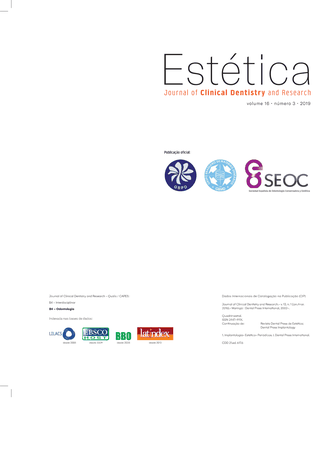
Esta coluna foi pensada com o intuito de responder a perguntas frequentes quando o assunto é a fotoativação. Dessa forma, em cada edição da revista, uma pergunta relevante ao tema será discutida, a fim de atualizar o leitor frente aos seus mais recentes avanços.
Leia mais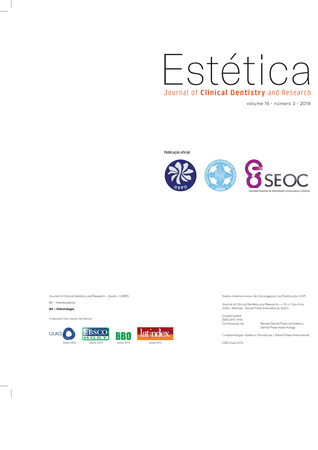
Atenção: a presente seção não tem a pretensão de ser um artigo científico. Nela, descreverei a experiência clínica associada ao aprendizado de uma carreira de 32 anos. Espero que aproveitem! Nessa seção, comentarei porque eu uso o Prepstart, um equipamento de jato de óxido com pressão controlada.
Leia mais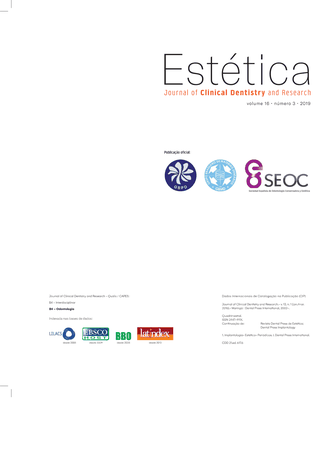
Com o rápido avanço da Odontologia digital, os pilares customizados híbridos são cada vez mais utilizados, assim como as restaurações projetadas para serem fixadas em uma base de titânio, também conhecida como Ti base. Os pilares de titânio mostram alta longevidade devido às suas propriedades físicas, oferecendo resistência mecânica suficiente para a sua utilização como base para a restauração final. Os pilares de zircônia podem ser personalizados, criando uma linha de...
Leia mais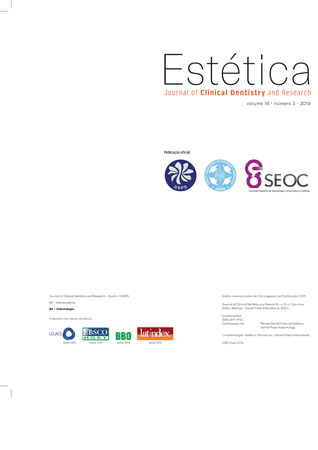
A evolução nas últimas décadas em qualquer atividade profissional, sobretudo em função da tecnologia da informação e da explosão da interação por meio das redes sociais, tem provocado mudanças significativas. Todavia, essas mudanças nem sempre resultam em benefícios. Nessa perspectiva, a Odontologia, como área de saúde tão elementar, muitas vezes tem sido negligenciada por algumas práticas preocupantes.
Leia mais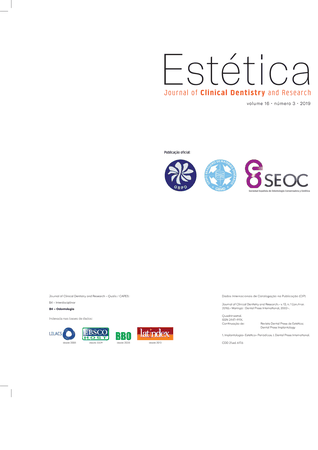
Em junho, realizamos o 23º Encontro do Grupo Brasileiro de Professores de Dentística, no Hotel Prodigy Santos Dumont, no Rio de Janeiro. Nosso objetivo era um congresso que privilegiasse tanto a clínica quanto a pesquisa e, principalmente, o ensino da Dentística. [...]
Leia mais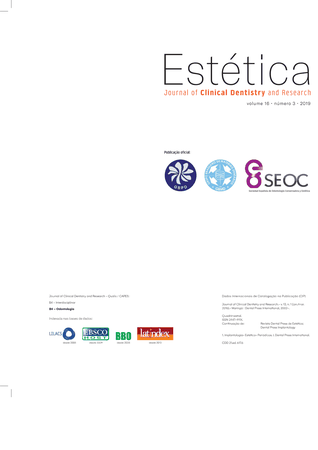
Quais são os critérios para se deixar um dente não irrompido nos ossos maxilares? Para controlar essa situação, requer-se um conhecimento prévio sobre o folículo pericoronário, especialmente sobre sua estrutura, funções e possíveis consequências de sua permanência. Imagiologicamente, existem critérios para se afirmar que ele está normal, e isso envolve avaliar a imagem, a espessura, o contorno e os limites do folículo pericoronário. Algumas doenças são exclusivas do folículo...
Leia mais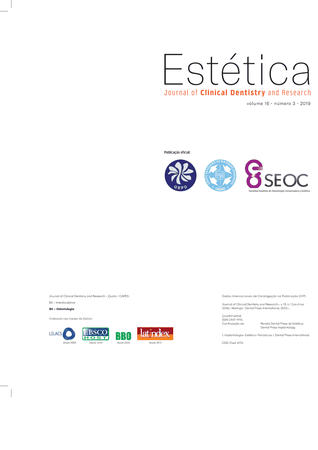
Chegamos para mais uma edição. Realmente estamos muito felizes com a repercussão da revista, com conteúdo real e verdadeiro, buscando ajudar e compartilhar com vocês, de maneira clara e objetiva, para auxiliar nas suas aplicações clínicas. Nessa edição, seguem mais alguns casos, agora imaginando que os feeds do Instagram, sem mostrar o número de curtidas, devem ter deixado muita gente “triste”, por ter comprado curtidas e seguidores... Mas vamos lá, para você, que está...
Leia mais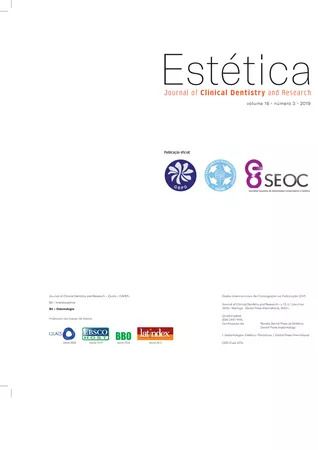
I often call people (teachers) who alarm others about everything as “chaos advertisers”. You know them because they are always saying, “The end is near”! “Chaos is imminent”! “Dentistry has already changed, and if you don’t follow it, you’re out”! Something in that line.
Leia mais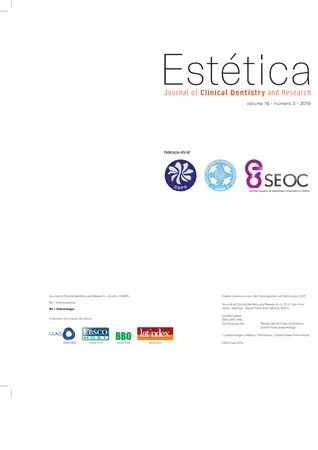
ULRICH LOHBAUER is the supervisor of the Dental Biomaterials Research Laboratory of Dental Clinic 1 (Operative Dentistry and Periodontics). The interests of the Laboratory are focused on the mechanical performance of dental materials such as multilayer ceramics, Nano particulate polymers or biocompatible and self-adhesive cements. The adhesive interface studied at the nanometer level for human tissue plays a central role in the microstructural evaluation of the tooth-restoration joint. An...
Leia mais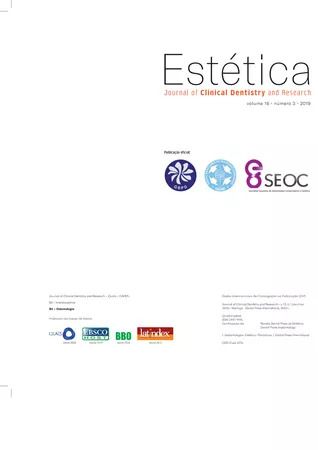
ABSTRACT: Introduction: Fractures in anterior teeth are frequently considered as emergencies in dental practice. Crown fractures not considered complicated involve enamel and dentin and may receive different levels of treatment, such as bonding the dental element or restoring it with composite materials. Objective: The goal of this study was to perform aesthetic and functional rehabilitation through the use of composite resins. Three cases of patients who suffered different degrees of...
Leia mais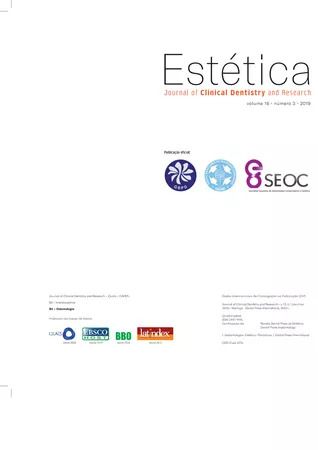
ABSTRACT: Introduction: This is the fourth article of a series of six manuscripts about composite resins in the last 10 years. The polymerization shrinkage is part of photopolymerization process and may cause shrinkage stress. It may be related to microleakage, enamel cracks, postoperative sensitivity and secondary caries. The aim of this literature review is to synthesize shrinkage polymerization data of different composite resins and discuss the postoperative sensitivity results of several...
Leia mais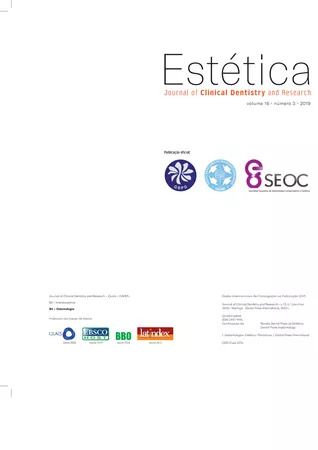
In order to approach and discuss the results of relevant topics in aesthetic dentistry, this section high- Lights will present a topic very popular among dental professionals: the use of light sources in dental bleaching. For this purpose, recent articles published in the important international journals were selected, which address different light emitters used during in-office bleaching.
Leia mais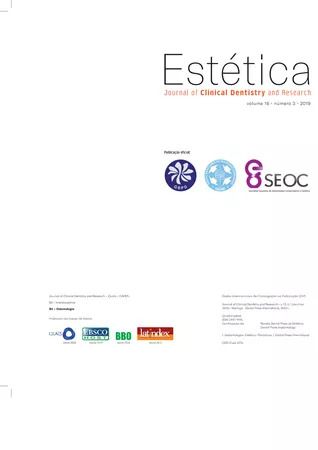
ABSTRACT: Objective: The aim of the present study was to evaluate the effect of different surface treatments and the processing of a lithium disilicate ceramic on bond strength and interfacial characteristics with a photoactivated resin cement. Methods: 20 pressed blocks (IPS e.max Press) and 20 blocks using the CAD / CAM technique (IPS e.max CAD) (10-mm diameter x 1-mm thickness) were made. Each type of processing was divided into four groups (n = 5), according to the type of surface...
Leia mais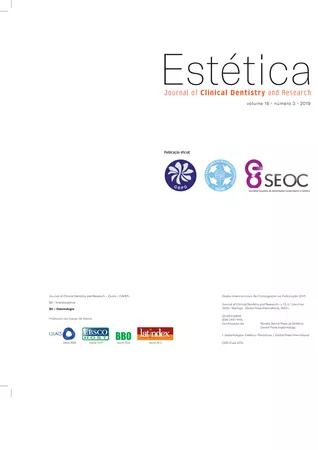
PRODUCT DESCRIPTION CleanJoy is a prophylaxis and polishing system with three fluoride pastes in different degrees of cleaning intensity. All pastes contain fluoride (700 ppm, help strengthen dental tissues and promote remineralization) and xylitol (bacteriostatic action). They have a pleasant mint flavor. The system allows for the effective and yet gentle removal of soft or mineralized plaque deposits from tooth surface
Leia mais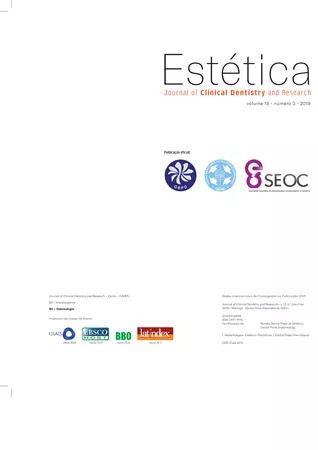
ABSTRACT: Introduction: The satisfactory performance of a restorative material when exposed to chemical challenge may be relevant for its clinical indication. Objective: This in vitro study investigated the effects of chemical challenge on compressive strength (CS), diametral tensile strength (DTS), surface roughness (R), surface hardness (H), fluoride release (F) and morphological characteristics (SEM) of popular restorative glass-ionomer cements (GICs). Methods: Maxxion R (MX) and Magic Glass...
Leia mais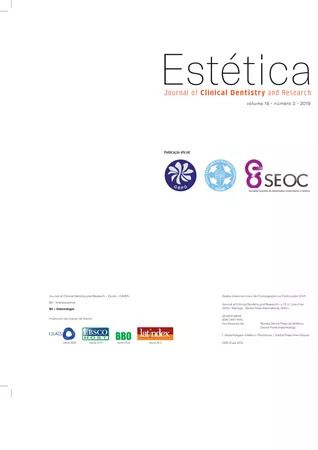
What would be the rationale for a dental occlusion section in a renowned Esthetic Dentistry journal? With esthetic treatments becoming more popular each year, unexplained failures are happening and require a better understanding of the masticatory system function. Moreover: the expectation relies in the belief that understanding occlusion, all the failures could be avoided. However, assigning to occlusion all responsibility for the success or failure of our treatments may not be reasonable.
Leia mais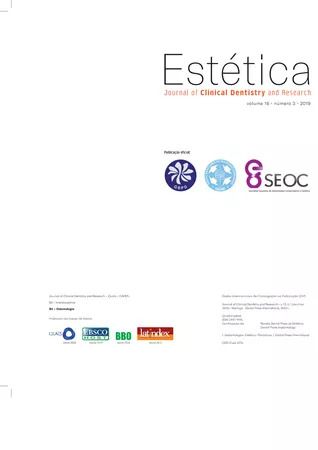
Dentistry can’t be everything. No job could. I decided to leave my professional box and go beyond words to talk about life. I wasn’t born a dentist; I became one. Dentistry can’t be the north for a life well lived. Unless you work with smiles, not teeth. I see a lot of people talking about laminates and ceramic protocols, resins vs. ceramics, pure dentistry, but the act of smiling goes beyond and transcends technique. To make yourself smile, it’s not enough to be a dentist; you have...
Leia mais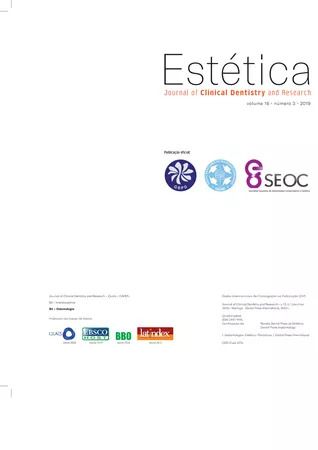
ABSTRACT: Objectives: To determine: (a) the influence of the light-curing unit (LCU) type (“monowave” vs. “polywave”) on the degree of conversion (GC) as a function of depth, for different formulations of bulk-fill composites; (b) which light evaluation parameter is able to predict photoactivation as a function of depth of bulk-fill composites; and (c) verify whether these parameters are related to the cost of the light source. Methods: Four LED-based sources were used (Poly...
Leia mais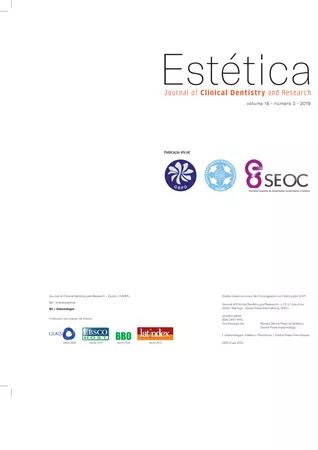
Autrán Dental is a newly created space, located in the neuralgic center of people’s routine, on the avenue with the greatest architectural identity of the city and in front of the Pedrera building, object of worship by all lovers of Gaudian architecture and, by extension, of most of the visitors of the city.
Leia mais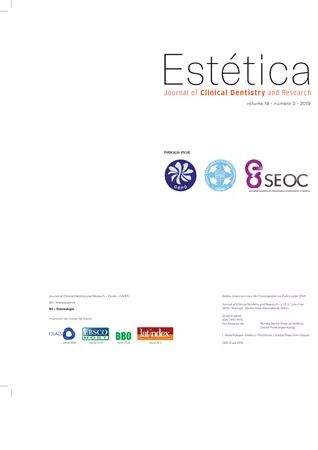
light curing adhesives, resin-based composites, sealants and resin modified glass ionomers, also in procedures that involve indirect restorations, such as cementation of restorations and intraradicular retainers with resin-based cements and even the bonding of orthodontic brackets. To summarize, the Esthetic Dentistry is highly dependent of the light curing. This, associated with the knowledge that color stability1, biocompatibility2 e mechanical resistance3 are directly related with the...
Leia mais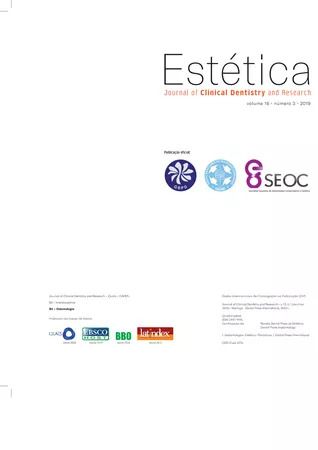
Note: This text is not a scientific paper. Here, I describe the clinical experience brought by learning during a 32-year-long career. I hope you enjoy it! In this paper, I describe why I use Prep Start, a pressure-controlled aluminum oxide abrasion unit. The use of this unit has been part of our clinical protocols for over 15 years. As soon as it was introduced in Brazil, the use of aluminum oxide abrasion to prepare cavities, instead of burs, raised great interest from dentists, who wanted...
Leia mais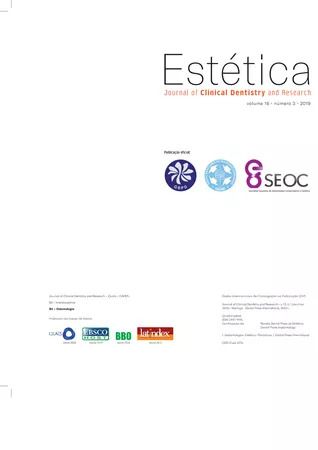
Digital Dentistry has advanced rapidly, increasing the use of customized hybrid abutments and restorations designed to be fixed to a titanium base, also known as Ti base. Titanium abutments, whose long-term longevity has been assigned to their physical properties, provide sufficient mechanical resistance to be used as a base for final restorations. Zirconia abutments may be customized to obtain a more superficial cementation line in relation to the gingival margin, slightly going into the...
Leia mais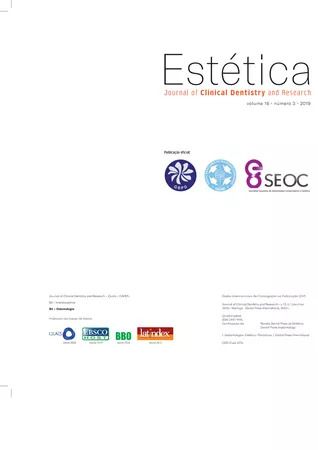
The evolution in the last decades in any professional activity, mainly in the functions of information technology and explosion of interaction through social networks, has caused changes. However, these changes do not always result in benefits. In this perspective, Dentistry as such an elementary area of health has often been neglected by some worrisome practices. When I say “worrisome practices”, I am not referring to the first moment in clinical practice, but far beyond that, I am...
Leia mais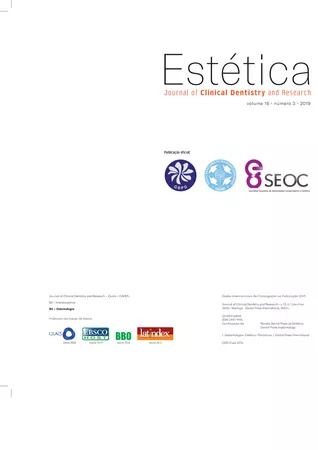
In June, the 23rd Meeting of the Group of Brazilian Teachers of Restorative Dentistry (GBPD) was held in the Hotel Prodigy Santos Dumont, in Rio de Janeiro. Our objective was to hold a conference that gave priority to both clinical practice and research, particularly to the teaching of Restorative Dentistry. That was not an easy task; we had to hold numerous meetings and discussions to clarify several questions. There was a great amount of anxiety and several concerns about having an event...
Leia mais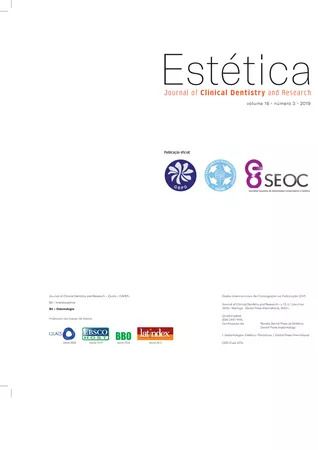
ABSTRACT: What are the criteria to leave an unerupted tooth in the maxillary bones? To control this situation, it is required a prior knowledge of the pericoronal follicle, especially its structure, its functions and the impact of its permanence. Through medical imaging, there are criteria to assert that it is normal and it involves evaluating the image, thickness, outline and the limits of the pericoronal follicle. Some diseases are exclusives from pericoronal follicle and therefore they...
Leia mais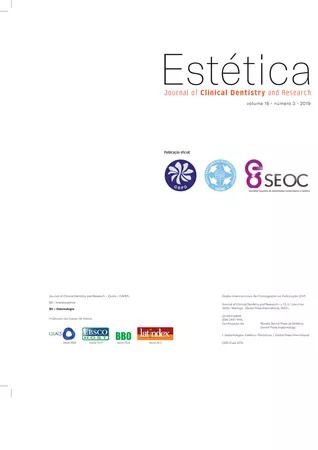
The bare truth about Instagram Here we are for one more issue. I should confess that I am, and we all are, very happy about this Journal’s repercussion, with its honest and reliable contents, whose clear and objective aim is to be shared with you and to support your clinical applications. In this issue, you will find some more cases - this time we imagine that Instagram feeds, which do not openly display the number of “likes” that a post has received, may have made many people unhappy...
Leia mais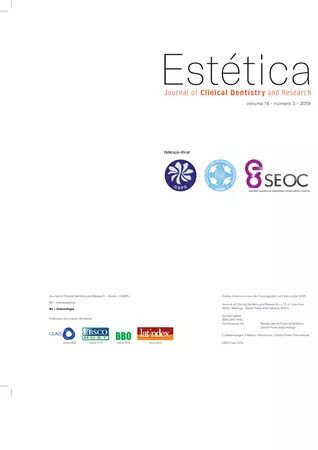
On July 30 and 31, 2018 a group of key opinion leaders met in Oslo, Norway. This meeting was the sixth “International Symposium on Light Sources in Dentistry”, also named “Northern Lights 2018”. The organizer of all editions of this event was professor and researcher Dr. Richard B. T. Price, who invited approximately 45 participants from different countries (Fig.1). For this event in Norway, Dr. Price invited three Brazilian researchers, Prof. Dr. Marcelo Giannini, and at that time...
Leia mais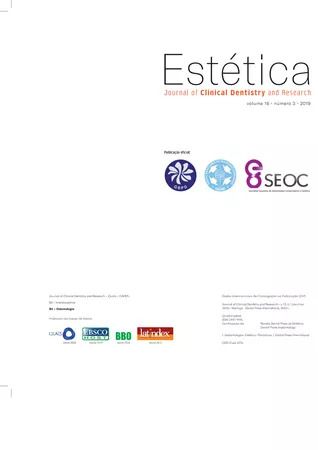
Another victory day in Dr. Playbo’s life begins... So many #strength #focus and #faith!
Leia maisCopyright © 1996 - 2024 DentalGO | Todos Direitos Reservados. DentalGO é uma marca Dental Press
Login